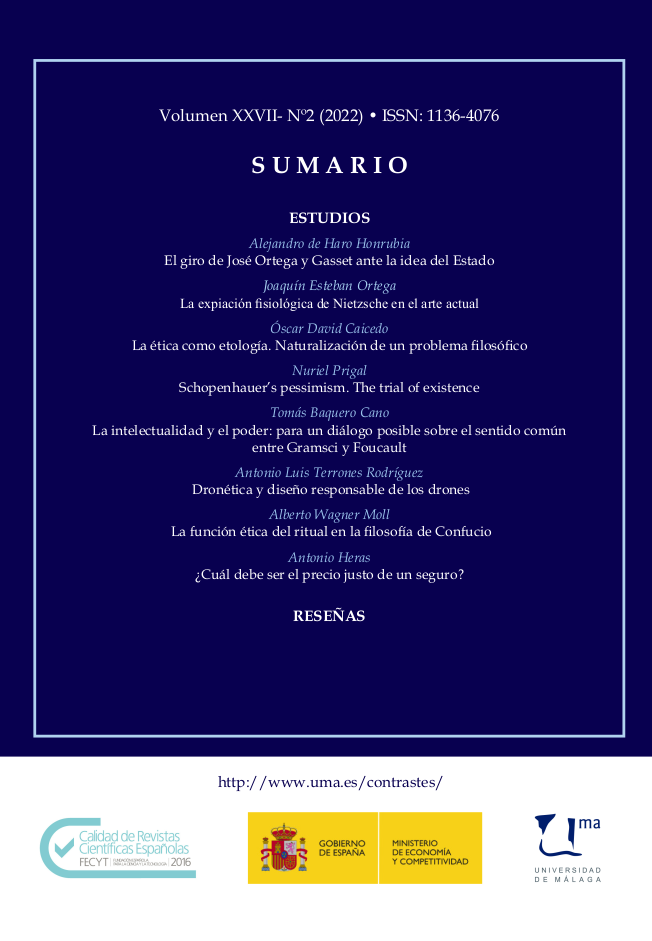Ethics as Ethology. Naturalization of a Philosophical Problem
DOI:
https://doi.org/10.24310/Contrastescontrastes.v27i2.12392Keywords:
Ethology, Neurophilosophy, Emotions, Morality, EvolutionAbstract
Naturalistic approaches to given philosophical problems are currently not as problematic as they used to be a few decades ago. The excessive speculation on certain topics has steadily receded compared to the scientifically oriented philosophy of present time. This article aims to present a biologically oriented approach to ethics that takes into account information and knowledge from ethology, cognitive science and neuroscience. Questions such as Why are we good?, Why are we so selfish or Why do we cooperate? –All of which stem from the field of ethics– are analyzed from the perspective of the philosophy of biology and neurophilosophy.
Downloads
Metrics
Publication Facts
Reviewer profiles N/A
Author statements
Indexed in
-
—
- Academic society
- N/A
- Publisher
- Universidad de Málaga
References
ALLEN, C., & BEKOFF, M. 1999. Species of Mind. The Philosophy and Biology of Cognitive Ethology. Cambridge: The MIT Press.
ARISTÓTELES. 2007. Ética Nicomáquea, edición de Julio Pallí. Barcelona: RBA.
CAICEDO, O. 2018. La cultura naturalizada. Hacia un concepto de cultura desde la filosofía de la biología.
Barranquilla: Sello Editorial Universidad del Atlántico.
CASTRODEZA, C. 2003. Los límites de la historia natural. Hacia una nueva biología del conocimiento. Madrid: Akal.
CHURCHLAND, P. 2012. El cerebro moral. Lo que la neurociencia nos cuenta sobre la moralidad. Barcelona: Paidós.
COLMENARES, F. 2015. Fundamentos de psicobiología, Vol. II. Comportamiento y procesos psicológicos en contexto evolutivo. Madrid: Editorial Síntesis.
DAMASIO, A. 1996. El error de Descartes. La razón de las emociones. Santiago de Chile: Editorial Andrés Bello.
-------- 2000. Sentir lo que sucede. Cuerpo y emoción en la fábrica de la consciencia. Santiago de Chile: Editorial Andrés Bello.
-------- 2010. Y el cerebro creó al hombre. ¿Cómo pudo el cerebro generar emociones, sentimientos, ideas y el yo? Barcelona: Editorial Destino.
-------- 2018. El extraño orden de las cosas. La vida, los sentimientos y la creación de las culturas. Barcelona: Editorial Destino.
DARWIN, C. 1936 [1871]. The Descent of Man and Selection in Relation to Sex. New York: Moderm Library.
EKMAN, P. FRIESEN, W., O'SULLIVAN, M., CHAN, A., DIACOYANNI-TARLATZIS, I., & HEIDER, K. (1987). «Universals and cultural differences in the judgments of facial expressions of emotion», Journal of Personality and Social Psychology, 53 (4), pp. 712–717.
MORGADO, I. 2017. La fábrica de las ilusiones. Bogotá: Ariel.
-------- 2019. Emociones e inteligencia social. Bogotá: Ariel.
MORGAN, C. 1903. An Introduction to Comparative Psychology, 2 ed. Londres: Scott.
PLUTCHIK, R. (1984). «Emotions: A general psychoevolutionary theory», en K. SCHERER, & P. EKMAN, Approaches to emotion. New York: Psychology Press, pp. 197-219.
PRICE, M. (2016). «La cooperación como un problema de la biología conductual», en V. SWAMI, Psicología evolucionista. Una introducción crítica. México: Fondo de Cultura Económica, pp. 84-119
SOBER, E. (2005). «Comparative Psychology Meets Evolutionary Biology. Morgan’s Canon and Cladistic Parsimony», en L. DASTON, & G. MITMAN, Thinking with animals: New perspectives on anthropomorphism. New York: Columbia University Press, pp. 85-99.
TOMASELLO, M. 2010. Por qué cooperamos. Madrid: Katz Editores.
TRIVERS, R. (1971). «The evolution of reciprocal altruism», The Quarterly Review of Biology (46), pp. 35-57.
VOLLMER, G. 2005. Teoría evolucionista del conocimiento. Granada: Editorial Comares.
WILSON, E. 2008. [1975]. Sociobiología. La nueva síntesis. Barcelona: Ediciones Omega.
WUKETITS, F. (1984). «Gnoseología evolutiva: el nuevo desafío», en K. LORENZ, & F. WUKETITS, La evolución del pensamiento. Barcelona: Argos Vergara, pp. 11-27.
Downloads
Published
How to Cite
Issue
Section
License
This journal provides immediate free access to its content under the principle of making research freely available to the public. All content published in Contrastes. Revista Internacional de Filosofía, are subject to the Creative Commons Attribution-NonCommercial-ShareAlike 4.0 license whose full text can be found at <http://creativecommons.org/licenses/by-nc-sa/4.0>
It is the responsibility of the authors to obtain the necessary permissions of the images that are subject to copyright.
Authors whose contributions are accepted for publication in this journal will retain the non-exclusive right to use their contributions for academic, research and educational purposes, including self-archiving or repository in open access repositories of any kind.
The electronic edition of this magazine is edited by the Editorial Service of the University of Malaga (Uma Editorial), being necessary to cite the origin in any partial or total reproduction.










5.png)
